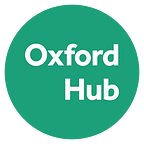Our Social Action Reading List for 2022
A new year, a new Social Action Reading List compiled by the team at Oxford Hub!
If you have missed previous year’s lists you can find 2021 here, 2020 here and 2019 here.
Oxford Hub has continued to grow and evolve in respond to our changing context. The core of our mission — working together to build a more equal, resilient, and connected community— has become increasingly important, as the pandemic has continued to expose the challenges of loneliness, isolation and growing inequality. We know that the scale of the issues we are facing is large, and growing. The current system approach to traditional ‘charity’ and ‘doing to’ doesn’t work. This year’s reading list is an encouragement to think more collectively, to overcome the pressures of going back to our old ways, and find more creative ways to rediscover our shared humanity.
We don’t promise we’ll achieve all the above with our Social Action Reading List, but we hope that you feel more inspired and motivated to shape a better world every day. As always, we’ll encourage you to join the discussion through our social media and newsletters.
- January — Dancing at the Edge: Competence, Culture and Organization in the 21st Century by Graham Leicester and Maureen O’Hara. A short starting point for the year. As we all grapple with January blues and resolutions, this new years’ pick offers a good introductory look at the skills that matter if we want to act systemically in the world around us.
- February — Modern Grantmaking by Gemma Bull and Tom Steinberg. We spent the second half of 2021 telling everyone to read this book. For the changes we want to see in the charity sector, we need a different approach to funding social change. This book begins to open up the conversation, and provides a really good introduction to some of the ways to kickstart a different approach. While it’s particularly targeted to staff and trustees at charitable foundations, it’s a worthwhile read for anyone working in the sector or interested in a career in fundraising.
- March — What Happened to You? by Dr Bruce Perry and Oprah Winfrey. This is an essential read for our Big Brothers Big Sisters mentors, and everyone working with children and adults who may have experienced challenging circumstances and trauma growing up. A hopeful look at the power of relationships (our favourite thing at Oxford Hub!) to heal and support people.
- April — Atlas of the Heart by Brené Brown. We can’t help it: we have a team of Brené Brown enthusiasts. This is a very different book from her previous works, reviewing different emotions and the ways in which they shape our experiences. It includes a good last chapter on meaningful connections, a ‘how to’ that will help you put into practice some of the ideas from our March book.
- May — Draw Your Weapons by Sarah Sentilles. There was a real obsession last May amongst the Oxford Hub team with Sentille’s 2021 book. This year we are revisiting her previous work, looking at art, war and peace through interconnected ideas, beautiful prose and storytelling.
- June — Hospicing Modernity: Facing Humanity’s Wrongs and the Implications for Social Activism by Vanessa Machado De Oliveira. This is not a quick or particularly accessible read, but definitely a worthwhile one to keep on revisiting, engaging with the exercises in the book, and probably best shared with others interested in how we approach social change.
- July — All About Love by bell hooks. For those mourning feminist icon bell hooks, or those who haven’t discovered her writing yet. This book is a reminder of the power of love to overcome social divisions (and a good follow on from our April book)! If you have never read bell hooks, this is also a great starting point, published in 2000 but more relevant than ever today.
- August —The Care Manifesto: The Politics of Interdependence by The Care Collective. As we rebuild the economy after the pandemic, this book covers some powerful ideas about how we can organise differently and in a more relational way. A reminder of how we rely on each other every day, and how we can put that at the heart of our society.
- September — Thick: And Other Essays by Tressie McMillan Cottom. Essay collections are generally under-appreciated. We enjoyed a really good Canadian collection last September, and so we have declared back-to-school-season the new essay-collection-season! This a good read about the experience of being a black woman in America, and its intersection with class, education, capitalism and more.
- October — Holding Change by adrienne maree brown. An opportunity to think about facilitation and opening up conversations about the change we want to bring about. A more pragmatic read than our June read, this book draws predominantly on the author’s experience of facilitation and mediation work with movement groups.
- November — Planet on Fire by Mathew Lawrence and Laurie Laybourn-Langton. We don’t need any books to realise that we live at the brink of climate disaster, but this is compelling writing which will make you question our current approaches and highlight the urgency to bring about changes to our economy.
- December — Ledger: Poems by Jane Hirshfield. The world needs more poetry, and this is a good festive read covering a lot of the things that really matter in the world.
